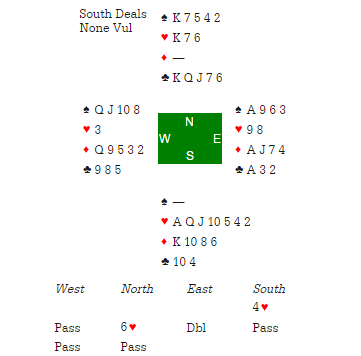Source: www.andrewrobson.co.uk
To bid and make a Small Slam, only one trick can be lost. But a defender holding two aces should not necessarily double a Small Slam – the opponents are likely to have a void somewhere so one of your aces may not win a trick. That said, you have to feel sympathy for this week’s East who, holding no less than three aces, watched his opponents bid and make a Small Slam. Here is the hand:

West led
West led  Q and dummy and East played low, declarer trumping. Correctly resisting the temptation to trump
Q and dummy and East played low, declarer trumping. Correctly resisting the temptation to trump  s, declarer realised that by far the easiest route to 12 tricks was to draw trumps then – assuming trumps split 2-1 – establish
s, declarer realised that by far the easiest route to 12 tricks was to draw trumps then – assuming trumps split 2-1 – establish  s by knocking out
s by knocking out  A. He cashed
A. He cashed  Q and
Q and  J then led
J then led  10. East ducked his
10. East ducked his  A, then won
A, then won  4 to dummy’s
4 to dummy’s  J. He had no sensible return so simply exited with
J. He had no sensible return so simply exited with  3. Declarer was able to enjoy dummy’s three established
3. Declarer was able to enjoy dummy’s three established  s discarding
s discarding  1086 from hand, trump
1086 from hand, trump  4, trump
4, trump  K with
K with  K, then table his remaining cards, all trumps.
K, then table his remaining cards, all trumps.
Last week we saw that it was a mistake to double a Slam if you would be unhappy should the opponents remove themselves to an alternative contract. This week we see that holding two – even three – aces is not a good enough reason to double.
ANDREW’S TIP: Do not double a freely bid Small Slam on the basis of holdingtwo – even three – aces.
